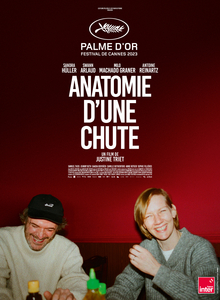This French legal drama film won so much international acclaim that it’s a must watch. Despite the death at its heart, the film actually uses the intense courtroom scrutiny as an excuse to dissect every detail and every layer of a relationship between a woman and her husband. Director Justine Triet ensures that multiple interpretations of every scene, situation or line of dialogue are possible at the same time. Not only is the truth is elusive no matter how hard we search for it but at some point it may have to be something that we decide for ourselves.
Sandra Voyter is a writer who lives with her husband and son Daniel in a remote mountain chalet near the French Alps. A female student arrives to interview her but her husband Samuel who is doing renovations in the attic plays music loudly to disrupt them. Later Daniel whose sight is impaired from an accident goes for a walk with his guide dog. When they return, they discover Samuel on the snow-covered ground, dead from an apparent fall. The autopsy results are ambiguous as there is a wound on Samuel’s head and the police suspect Sandra of murder. She calls in an old friend Vincent who is a lawyer to defend her. He suggests the possibility that Samuel may have committed suicide and Sandra recalls an incident in which he apparently overdosed on aspirin. But the police finds an audio recording of the couple arguing from the day before. In the courtroom, every detail of the couple’s relationship is exposed to scrutiny. Sandra claims that Samuel resented her success as a novelist as he has given up on writing himself while she blames him for Daniel’s accident and forcing them to move to his hometown. As she is German, her lack of proficiency in French leads her to use English instead, alienating her. Out of concern that she will influence Daniel’s testimony, the court assigns a minder to stay with him.
Like most procedurals, this film is incredibly detail oriented. The police fixate on the blood spatter found on the side of a shed below the attic window, reenact the fall with a dummy and use police actors to read lines to precisely place Daniel’s position when he heard his parents talking. In this instance, the detail also extends to the nuances of their relationship. The aggressive prosecutor asks about Sandra stealing an idea from Samuel for her own book, about the affairs that she has had, about whether or not she was flirting with the female student interviewing her and Samuel was jealous about it. Sandra is caught lying about an injury on her wrist while Daniel retracts a statement about being outside when he heard them talking and possibly arguing. The best scene is the argument the couple have which Samuel secretly records. Samuel claims that he has given everything, sacrificed his time and has nothing left to give. Sandra retorts that if there is a trap it must be of his own making, forged out of his own insecurities and lack of confidence, as nothing stops him from writing and he was the one who chose to move the family here. The wonder of this scene is that both arguments could be viable depending on your perspective, contributing to the larger point that one has to choose their own truth.
One issue here is that as Triet insists on preserving the ambiguity of Sandra’s guilt or innocence to the very end, there’s no satisfying punch line. It just sort of peters out and even what Daniel thinks about his father’s death and the trial is left as an open question. I also wonder if the film cheated in having forensics fail to determine if this was a suicide or a murder. The authorities seem to give up too easily on finding the murder weapon. The prosecutor argues that it could have been any object and Sandra could have gotten rid of it easily. Yet if it was a murder, Sandra only had the time when Daniel was out on his walk to dispose of the weapon. Since she was supposed to be inside the house the whole time, it should be fairly obvious if she had gone outside in the snow for an extended period. It works better for the film for there to be very little physical evidence so the case hinges on the dynamics of their relationship and Samuel’s psychological state. But it does seem like an obvious flaw to me.
Critics have been effusive in their praise of this film and I’d agree that the depth of its detail makes it a riveting watch. But it’s also true that this is a very straightforward film and the observation that the truth is complex is hardly an original insight. It’s a great film but it’s probably not going to stay in your mind for very long and just doesn’t feel that unique.
